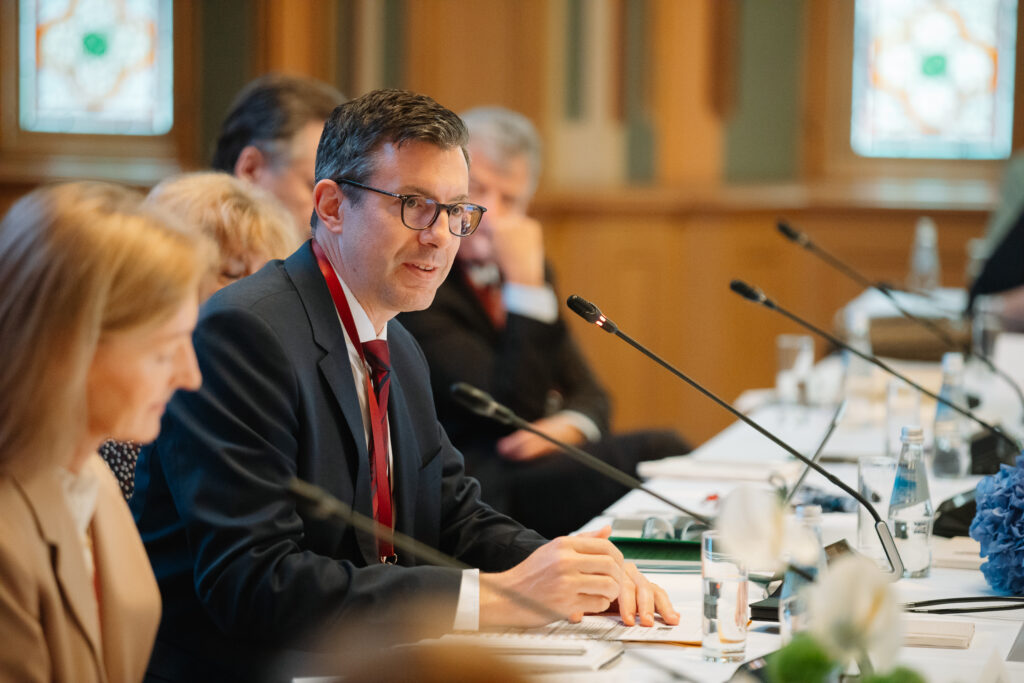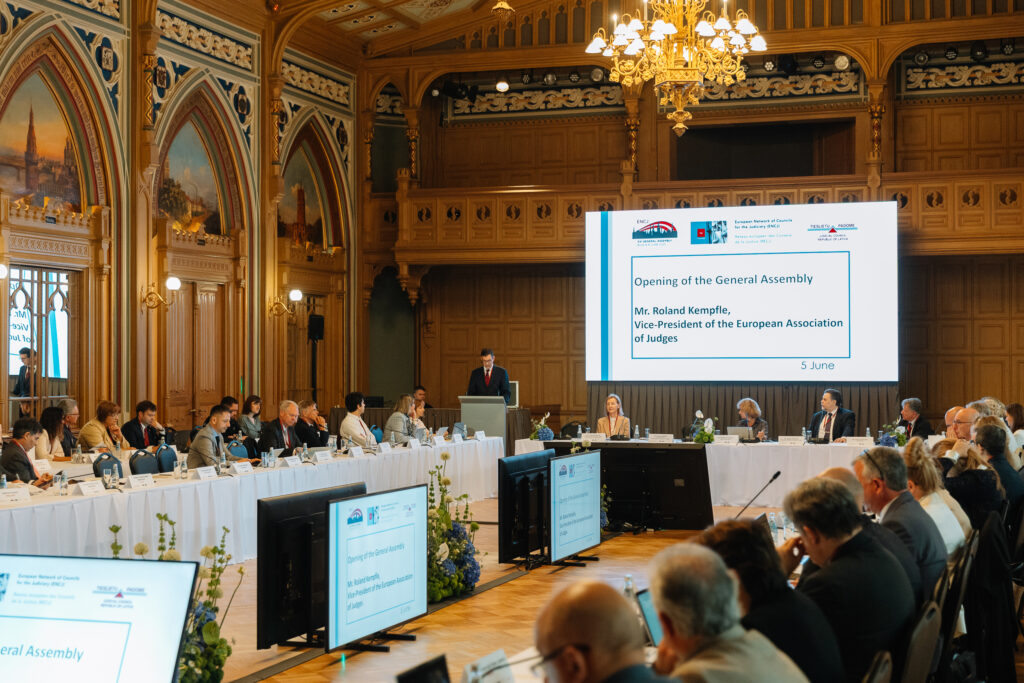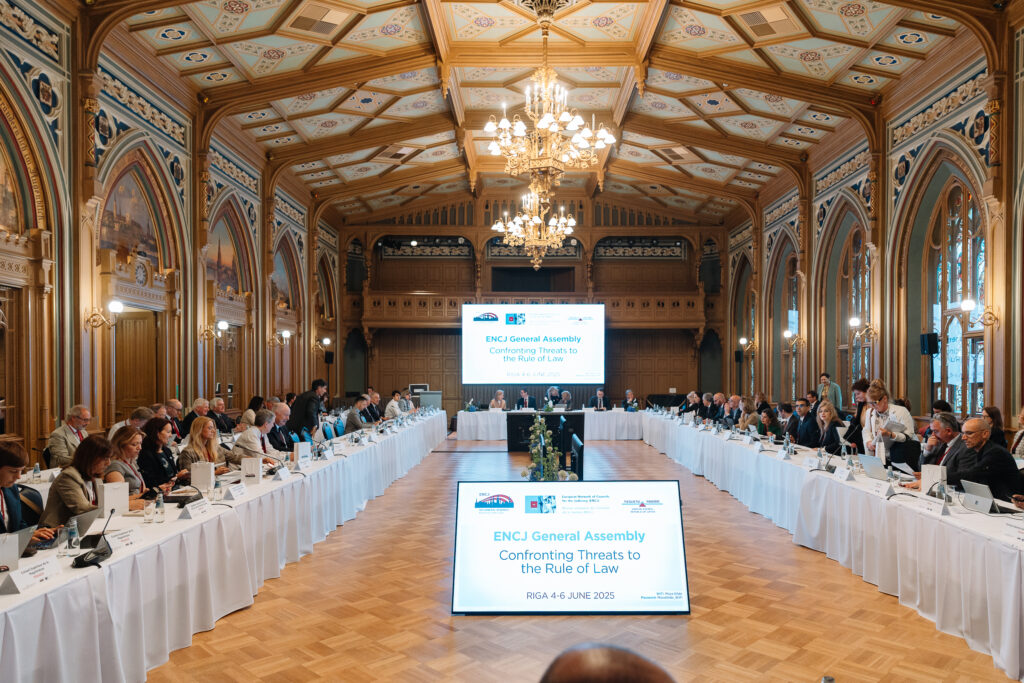Vice President Roland Kempfle represented the EAJ at the General Assembly of the European Network of Councils for the Judiciary (ENCJ) that took place in Riga from June 4th to 6th, 2025. His opening remarks addressed current threats to the rule of law both within and outside Europe. Vice President Kempfle recalled the Rule of Law as the very strength Europe is built upon and called for mutual cooperation of judicial associations and councils for the judiciary to tackle any threats.
The EAJ and the ENCJ have been cooperating successfully for many years. The mission of the ENCJ is to promote and protect the Rule of Law within Europe, in particular, through defending and strengthening the independence of the judiciary. The ENCJ uses various approaches and engages different tools to fulfil its mission.
This year, several critical results in promotion of the Rule of Law and strengthening judicial independence were achieved.
First, the Declaration of Riga, dedicated to ‘Confronting the Threats to the Rule of Law’, was adopted. Recent political shifts, societal changes, changes in the media landscape and effects of digital advances have given rise to challenges to the Rule of Law. The declaration therefore singles out the areas, where such challenges arise from the viewpoint of Councils for the Judiciary. The following approaches to confront these challenges are identified: the necessity of constant vigilance of Councils for the Judiciary to timely identify the threats to judicial independence and the Rule of Law; building trust of society in the judiciary; telling the story of the judiciary, including, what added value an independent judiciary brings for citizens and what benefits it provides to their country’s economic welfare and stability; building and maintaining the resilience of the judiciary. Lastly, the fundamental value of solidarity among the European judiciaries is underlined.
Second, for the 5th time the ENCJ Survey among Judges on the Independence of the Judiciary was carried out in 2025. This Survey is a unique tool, which gives voice to the judges of Europe, to speak up and evaluate their own independence/independence of the judiciary and identify the existing pressures/pressure points. More than 19 thousand judges from 32 judiciaries participated in the Survey, with judiciaries of Moldova and Ukraine taking part for the first time. While the report provides numerous relevant data for each jurisdiction and is therefore an excellent tool to identify areas for improvement, the following key takings are worth mentioning:
- While judges value their independence generally positively, the trend of gradual improvement of judicial independence, observed since 2015, comes to a halt. In some jurisdictions, declines are visible;
- The Survey makes clear that tension between judiciaries and the other state powers increased in many respects, in particular: (1) lack of implementation of judicial decisions that go against the interest of government has increased, (2) working conditions, in particular the low/lagging remuneration of judges and high workload/insufficient court resources, are increasingly becoming a threat to independence (3) lack of respect for judicial independence by government and parliament is seen as an issue by many respondents;
- In most judiciaries, judges feel inappropriate pressure from the (social) media at case level. Many of them feel that their independence is not respected by/on the (social) media;
- Decisions concerning the appointment and career (promotion) of judges continue to be a point of concern. Appointment (promotion) to the Supreme Court is seen as particularly troubling in a number of jurisdictions.
The survey provides many more insights into the functioning of the judiciary at national level. It is up to the Councils for the Judiciary and other governing bodies to analyse the outcomes for their judiciaries and address the issues that are raised by the respondents. The ENCJ encourages to use the results of the Survey to draw the attention of the other state powers, on which the Councils are dependent to adopt legislation and provide resources, to underline the existing problems.
The full report is available at: https://pgwrk-websitemedia.s3.eu-west-1.amazonaws.com/production/pwk-web-encj2017-p/Report%20ENCJ%20Survey%20on%20Independence-compressed_0.pdf




